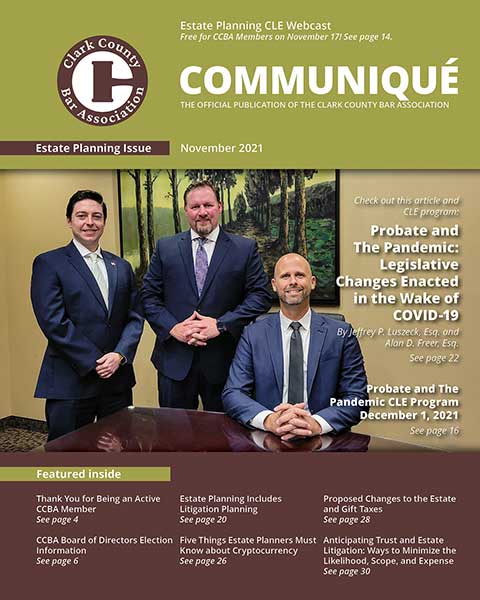Anyone who creates a will or trust expects the document to be honored after their death. Unfortunately, challenges to the probate of a testator’s will or administration of a trustor’s trust are an unwelcome reality for many families. Based on very little information, an interested person may ask the probate court to declare a will contest declared under NRS 137 or assume jurisdiction of the trust and hear disputes over its validity under NRS 153, 164, and 165. Estate planning prepared by a competent attorney will anticipate these conflicts and plan ways to reduce them.
Proper execution of documents; secure the originals
A challenge to a will or trust begins with whether the document was properly executed. This includes meeting the requirements of a valid will or trust. See NRS 133.040, 163.002-0095. Although subscribing witnesses may sign the required affidavits after the fact, it may be difficult to locate them decades after the will was executed. See NRS 133.050. While handwritten “holographic” wills are valid, authenticity of the testator’s handwriting may be disputed. See NRS 133.090. An amendment to a will or trust that does not comply with the legal requirements, or the method of amendment permitted by the trust, is likely to be disputed. See Restatement (Third) of Trusts § 63 (2003).
Other common disputes over a will or trust are fraud, duress, undue influence, Nevada’s “Caregiver” statute (NRS 155.093, et. seq) and lack of capacity. Anticipating conflicts regarding capacity, an estate planner may have the testator obtain a doctor’s letter regarding the testator’s mental capacity. To ensure the statutory presumption cannot void the will or trust, an estate planner may have another attorney complete a Certificate of Independent Review of the will or trust pursuant to NRS 155.0975. Nevada law even provides a way to declare a trust valid while the settlor is alive but incompetent. See NRS 164.015.
It is important to keep track of the location of the original estate planning documents.
Identifying and disinheriting heirs
Disinheriting a child requires estate planning, otherwise intestate succession laws under NRS 134 dictate the disposition of the decedent’s assets. The omission of a child or grandchild of a testator from a testator’s will is presumed intentional. NRS 133.170. Documents not updated after a birth, death, marriage, divorce, or annulment may create opportunities for litigation. See, e.g., NRS 136.160 (rights of child born after child’s parent makes a will), 133.110 (revocation by marriage), 133.115 (revocation of provisions in favor of former spouse on divorce or annulment, exceptions). For example, Nevada’s “anti-lapse statute” may prevent a bequest from lapsing due to a beneficiary pre-deceasing a testator. See NRS 133.200.
Don’t rely on a no-contest clause
A standard “no-contest clause” in a will or trust is intended to deter beneficiaries from disputing the document by forfeiting any inheritance if they challenge it in court. While such a clause is enforceable, Nevada law provides two “safe harbor” statutes defining what conduct does not constitute a “contest.” See NRS 137.005 (wills), 163.00195 (trusts). A no-contest clause must not be enforced by the court and the heir’s share may not be reduced or eliminated because the party acts to “enforce the clear and unambiguous terms” of the document; enforce legal rights; obtain court instruction with respect to the proper administration of the trust/estate or the construction or legal effect of the document; enforce fiduciary duties; or, institutes legal action to invalidate the document in good faith and based on probable cause. While a generic no-contest clause is unlikely to prevent litigation, a carefully designed clause, paired with a small inheritance that the heir would not want to forfeit, may prevent a contest.
Consider a mandatory mediation or arbitration clause
In Nevada, a mandatory arbitration clause in a will or trust, other than for disputes of the validity of all or a part of a will or trust, is enforceable. See NRS 164.930. While a mandatory arbitration provision may not avoid all litigation, it can limit the expense and scope.
Given the frequency, delay, and expense of trust and estate litigation, the value of a competent estate planning attorney who will give special consideration to anticipated conflicts and take precautions to minimize litigation of those conflicts after death, thus avoiding unintended distribution of assets, cannot be overstated.
About the author

Kendal Weisenmiller is a Member at Dawson & Lordahl, PLLC. Since 2010, Kendal’s practice has focused on probate and trust litigation and probate administration, representing a variety of parties in a range of complex matters. Kendal has earned the AV/Preeminent® rating from Martindale-Hubbell, and was selected to Super Lawyers® Rising Stars for 2017-2020 and Nevada Business Magazine’s Legal Elite in 2014 and 2016-2021.

About this article: This article was originally published in the “Estate Planning” issue of Communiqué, the official publication of the Clark County Bar Association, (November 2021). See https://clarkcountybar.org/about/member-benefits/communique-2021/communique-november-2021/.
© 2021 Clark County Bar Association (CCBA). All rights reserved. No reproduction of any portion of this issue is allowed without written permission from the publisher. Editorial policy available upon request.
